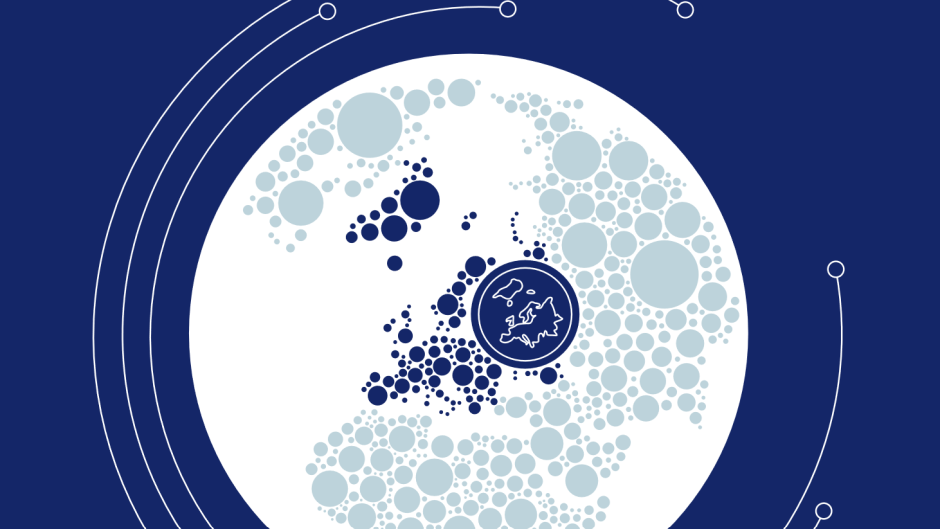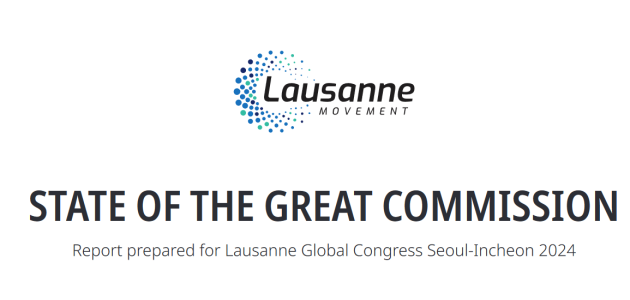European Christians challenged to display the gospel with humility amidst the rise of technology, loneliness and ‘spiritual hunger’
Analysts note “a shift in morality that is affecting the way many Europeans interpret the ‘good news’ of the Gospel”. The State of the Great Commission report is the reference document for the 5,000 evangelical leaders at the Lausanne 4 Congress in Seoul.
20 SEPTEMBER 2024 · 13:18 CET

Europe is going through a major cultural shift and Christians should reflect on how to communicate the gospel in this new context.
The “State of the Great Commission Report”, published ahead of the major Lausanne Movement congress in Seoul these days (22-28 September), is expected to become a reference document for evangelical churches and mission agencies around the world.
With 500 pages authored by over 150 experts representing all regions in the world, the report includes a 10-page section on Europe.
A “radical change of mindset” in Europe
“There is radical change in the European mindset over a relatively short time period”, say the authors brought together by the Lausanne Movement in the continent. Amidst a “massive rise in individualism”, “personal experience has become key to validating truth”, and therefore “objective all-encompassing truth claims” of religious institutions are now seen by most as “unethical”.
Christianity, which long dominated the European worldview, is now seen by many as “bad news: morally corrupt, intellectually naïve, and emotionally irrelevant”.
In this context, “the leading question ahead of the church must therefore be: How can we live and speak of the power, beauty, and truth of the gospel so that Europeans perceive it as good news?”, they ask.
The authors of the report’s section analysing the reality and future of Europe are: Julia Garschagen, Luke Greenwood, Rolf Kjøde, Jim Memory, Usha Reifsnider, Janet Sewell.
The Great Commission in Europe
Christians in Europe who have understood the New Testament’s “Great Commission” must “bring our Christian faith into fresh dialogue with the burning questions of society, culture, politics, science, and technology”.
In practice, “churches need to humbly leave room for critical questions, doubt, and conversation. In apologetics we will encourage debate not only on complicated intellectual issues but also delve into more existential questions touching upon the lives of ordinary people”.
Right now, “a further privatization of faith” is encouraged, as thinkers and influencers in all areas of society praise the fact that Christendom has been left behind. “Mission is seen as immoral because it imposes one’s truth on others” and “a further privatization of faith” is encouraged.
European “believers are reluctant to share their personal faith; Christian humanitarian organizations communicate little about their Christian motivation”.
Therefore, “the right to speak truth must be earned by living out discipleship in ways that build trust”, the authors say, and for this, “the Christian home has an enormous capacity as a place for building warm relations and inviting people in”.
Some other answers to this at times hostile context for the gospel in Europe, include “being a welcoming space for people from different minorities, walks of life, and backgrounds”, acknowledging that today’s Europe is a “pluralistic society with many different ways of living”.
Opportunities and the need for “a major shift” in evangelism
The report also points to open doors for the gospel. Maybe earlier than expected, secular thinkers are “beginning to realize how deeply European values are in fact rooted within the Christian framework and how human rights and dignity presuppose an objective moral ground that cannot be found in secular relativism”.
This, the report says, has led to “start of a new conversation on moral orientation”.
Christians “need to enter this dialogue with wisdom and humility, showing why the Jesus we follow actually tells ‘the better story’ and how the gospel is deeply good for the flourishing of the individual and society as a whole”. The challenge for churches is to “show the plausibility structures of our faith”.
But now that “life in European cities has become so busy and distracted by the draw of a materialistic lifestyle”, there is a risk for the population to not even being aware of the presence of local churches.
“Europeans are growing old alone, in desperate need of the living community that the church of Jesus represents, but unable to find it or relate to it”, and “this calls for a major shift in our evangelistic strategy”.
“Now is the time for the European church to step outside its comfort zone and go to a community that may seem too busy, or isolated, but that is deeply spiritually hungry”, the Lausanne analysts say.

More than 150 authors have contributed to the 500-page document. Cities, technology and deep solitude
Addressing the realities of the younger generations, the report says “Millennials and Gen Z are significantly marked by two clear heartfelt needs: lack of meaning and loneliness”.
“For young people today, building community online is instinctive and a natural extension of their physical community”.
Churches need “good theologies centred around the intersection of faith and technology to create frameworks within which the church can operate, but equally to help developers think through the theological implications of the new technology they create”.
Sustainability, immigration, and the lack of births
Climate change and a sustainable future have become a priority for the youngest, and the Bible addresses the main problem behind the issue: greed, which is a “spiritual issue”.
Although some organisations and churches have worked hard in the last years to produce Christian thinking on creation care, there is still a “lack of theologies that integrate creation care and climate justice”. This can be a “barrier for the gospel for the younger generation”.
The lack of births across Europe is another major challenge. “Some Mediterranean countries now have birth rates that are among the lowest in the world” and “much of Eastern Europe populations are expected to decline by more than 20 percent by 2050”, the report says.
Meanwhile, “the number of international migrants residing in Europe has risen from 64 million in 2005 to 87 million in 2020 overtaking Asia and making it the largest destination for international migrants globally”.
The authors underline that “what encourages parents to have children is not financial compensation but a society that truly values parenthood. Europe desperately needs a renewed and healthy vision for marriage, parenthood, and the family”.
The church must “go beyond merely defending the traditional nuclear family, but rather reflecting deeply on how the local church might be a family to all”. This includes “contextualizing the gospel for third-age Europeans so they can preach hope, even in death, to those who have never heard it”.
In a socio-political context in which populist nationalisms are on the rise, the authors lament that “sadly some Christian leaders have sided with the far-right in their rhetoric of ‘defending Christian Europe’”.
Yet, “out of the spotlight, many Muslims in Europe are turning to Christ”, while “millions of Majority World Christians now live, work, worship, and witness in Europe”.
“African, Asian, and Latin American churches can be found in every corner of the continent. The challenge is to encourage them to do more than merely gather Christians from their own nations and ethnicities but to reach out to Europeans interculturally”.
A revival of the church?
The European authors end with a hopeful outlook. “The revival of the church in Europe will depend on how European and Majority World churches work together”, they say.
The section on Europe summarised in this article can be found on pages 423-432 of the State of The Great Commission report, which can be downloaded on the Lausanne Movement website.
One more year
Learn all about our #OneMoreYearEF campaign here (English).
Published in: Evangelical Focus - europe - European Christians challenged to display the gospel with humility amidst the rise of technology, loneliness and ‘spiritual hunger’
